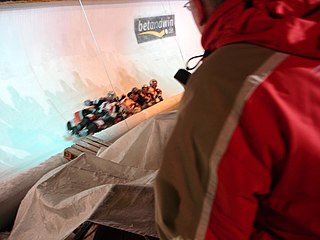
The 1964 Winter Olympics, officially known as the IX Olympic Winter Games and commonly known as Innsbruck 1964, was a winter multi-sport event which was celebrated in Innsbruck, Austria, from January 29 to February 9, 1964. The city was already an Olympic candidate, unsuccessfully bidding to host the 1960 Games. Innsbruck won the 1964 Games bid defeating the cities of Calgary in Canada and Lahti in Finland. The sports venues, many of which were built for the Games, were located within a radius of twenty kilometers around Innsbruck. The Games included 1,091 athletes from 36 nations, which was a record for the Winter Games at the time. Athletes participated in six sports and ten disciplines which bring together a total of thirty-four official events, seven more than the 1960. The luge made its debut on the Olympic program. Three Asian nations made their Winter Games debut: North Korea, India and Mongolia.
Luge at the 1964 Winter Olympics consisted of three events at Olympic Sliding Centre Innsbruck. The competition took place between 30 January and 4 February 1964.
Josef Feistmantl was an Austrian luger who competed from the mid-1950s to the early 1970s. He competed at three Olympic Games.
Manfred Stengl was an Austrian luger.
Helmut Thaler was an Austrian luger who competed from the late 1950s to the late 1960s. He won the silver medal in the men's doubles event at the 1964 Winter Olympics in Innsbruck and competed at the 1968 Winter Olympics.
Walter Aussendorfer was an Italian luger who competed during the early 1960s. He was born in Tiers. He won the bronze medal in the men's doubles event at the 1964 Winter Olympics in Innsbruck.
Siegfried Mair was an Italian luger who competed from the early 1960s to the early 1970s. He was born in Toblach. He won the bronze medal in the men's doubles event at the 1964 Winter Olympics in Innsbruck.
Ewald Walch was an Austrian luger who competed from the mid-1950s to the early 1970s. Competing in two Winter Olympics, he won the silver medal in the men's doubles event at the 1968 Winter Olympics in Grenoble.
Walter Plaikner is an Italian former luger and coach of Austrian descent who competed in the late 1960s and early 1970s. He was a doubles specialist, and competed alongside Paul Hildgartner. They won the gold medal in the men's doubles event at the 1972 Winter Olympics in Sapporo. Plaikner also competed at the 1976 Winter Olympics in Innsbruck, where he finished 11th in the doubles after suffering from a severe bout of flu. He retired from competition after the Games.
Franz Schachner is an Austrian former competitive luger who competed during the mid-1970s. Teamed with Rudolf Schmid together they won the bronze medal in the men's doubles event at the 1976 Winter Olympics of Innsbruck.
Giampaolo Ambrosi was an Italian luger who competed during the early 1960s. He won the gold medal in the men's doubles event at the 1962 FIL World Luge Championships in Krynica, Poland.
Aigars Kriķis. was a Latvian Soviet luger who competed during the late 1970s. He won the gold medal at the men's doubles event at the 1978 FIL World Luge Championships in Imst, Austria.
Paul Aste was an Austrian bobsledder and luger who competed during the 1950s and the 1960s. He also took the Olympic Oath for athletes at the 1964 Winter Olympics in Innsbruck.
Stefan Hölzlwimmer is a West German former luger who competed in the late 1970s. He won the bronze medal in the men's doubles event at the 1977 FIL European Luge Championships in Königssee, West Germany.

The Olympic Sliding Centre Innsbruck is a venue for bobsleigh, luge and skeleton located in Igls, Austria. The most recent version of the track was completed in 1975 and is the first permanent, combination artificially refrigerated bobsleigh, luge, and skeleton track, serving as a model for other tracks of its kind worldwide. It hosted the bobsleigh, luge, and skeleton competitions for the 2012 Winter Youth Olympics.
The Women's singles luge competition at the 1992 Winter Olympics in Albertville was held on 11 and 12 February, at La Plagne.
The Doubles luge competition at the 1976 Winter Olympics in Innsbruck was held on 10 February, at Olympic Sliding Centre Innsbruck.
The men's singles luge competition at the 1964 Winter Olympics in Innsbruck was held from 30 January to 4 February, at Olympic Sliding Centre Innsbruck. Tragedy affected the event as British luger Kazimierz Kay-Skrzypecki was killed during a practice run on January 23, seven days before the start of the competition.
The Women's singles luge competition at the 1964 Winter Olympics in Innsbruck was held from 30 January to 4 February, at Olympic Sliding Centre Innsbruck.



